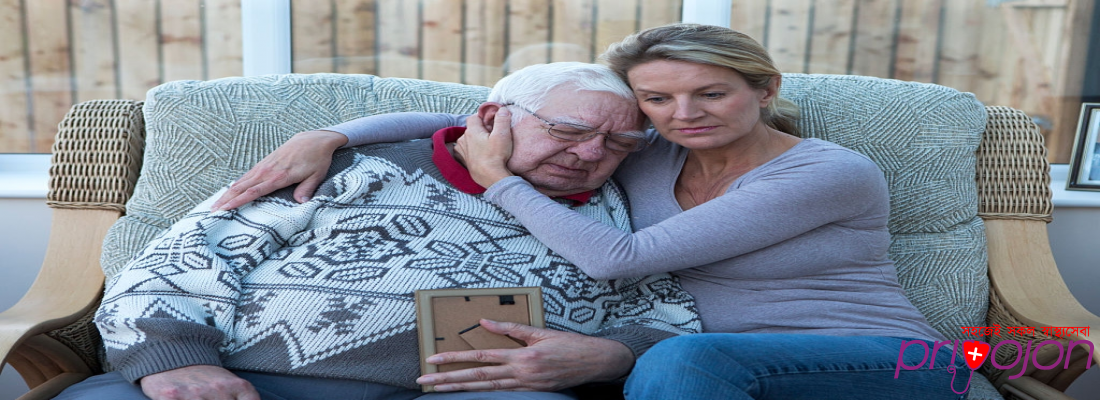Shared on 05-04-2020
What You Can Do About Dementia
What You Can Do About Dementia

Your doctor’s voice drops to that tone we all save for delivering bad news. “The test results are back and you have dementia.” Questions swirl around your head and you struggle to voice them.
- How can you fight dementia?
- What are the symptoms of dementia?
- Can the symptoms of dementia come and go?
- What will this mean for your life and the lives of your loved ones?
Or maybe you are noticing in yourself or in a loved one signs of dementia that you can’t deny. You haven’t talked to your doctor yet but you search the internet to find answers to the same questions. Take hope. Recent research is finding strategies that can combat dementia symptoms and improve your brain health. Dementia is often a long and difficult journey but you can focus on what you can do and the time you have. While there is no cure, you can still find the beauty in this stage of life.
Symptoms of Dementia
If you are recently diagnosed with dementia or wondering if you or a loved one has dementia, find out the symptoms. Dementia is not an actual disease, it is a term that refers to a variety of symptoms that are connected to a decline in memory and thinking skills that limit your ability to complete your everyday activities.1 This can include Alzheimer’s disease, vascular dementia following a stroke or many other conditions that cause dementia symptoms. The abilities that are impacted are:
- Memory, particularly of recent events
- Communication and language (i.e. repeating questions, forgetting names, not being able to find words)
- The ability to focus and pay attention (forgetting appointments, forgetting the steps to everyday activities, neglecting safety, hygiene and nutrition)
- Reasoning and being able to make clear decisions (getting lost in familiar places, misplacing common objects, unable to follow directions)
- Visual perception
Dementia is a result of damage to your brain cells. This makes it difficult for the brain cells to communicate with each other. The loss of brain cell communication means changes in how you think, behave and feel.
Can Dementia Come and Go
While an official diagnosis is permanent, you might notice that certain symptoms from dementia can ease off and reappear without warning. How dementia progresses for each person is different and this can make it feel like your loved one is “getting better” at times. Mild dementia can have a very minor impact of your loved one’s functioning, while rapid dementia can cause what feels like a loss of function overnight.
5 Ways to Fight Dementia
Although you can not erase a diagnosis of dementia, here are some research-based tips for preventing memory loss.
Brain Training. A study that followed 2,800 aging adults for a decade found that using brain-training exercises reduced the risk of dementia by 29%.2 This research agrees with other studies that have suggested the higher your cognitive level prior to dementia, the less pronounced the initial symptoms will be. The specific brain training studied was a computer game that increased the participants' speed of processing. The game did this while flashing images on the screen that the participant had to click on while avoiding conflicting pictures and images. Other research has shown that hobbies like painting, playing music, dancing, carpentry, reading and using a computer can keep the brain actively engaged and helped with dementia symptoms.
Reducing Inflammation. Chronic inflammation, also defined as continual stress in your body, is bad for your health. But also bad for your brain! A study found in Brain: A Journal of Neurology found that inflammation that causes high blood pressure, heart disease and diabetes may lead to symptoms of dementia. Numerous studies have found that inflammation can be reduced through diet, exercise and self-care.4 Self-care includes not smoking, reducing your blood pressure, cholesterol and blood sugar and keeping a healthy weight.
Nutrition. The best way to protect your brain health is thought to be through protecting your heart. The latest research is pointing to a heart-healthy way of eating, such as the Mediterranean diet. This diet may keep your brain functioning at its best. A Mediterranean diet has a focus on whole grains, fruits and vegetables, fish and shellfish, nuts, olive oils and other healthy fats.
Supplements. There are many different herbs and supplements available that all claim to promote a healthier brain. Not all of them can be backed by scientific research but some show promising results. A recent study published in the American Journal of Geriatric Psychiatry looked at the use of turmeric, that bright yellow spice commonly found in curry, to improve memory and attention. Over 18 months the participants took 90 mg of curcumin, the medicinal part of turmeric, twice a day. Brain scans at the end of the study found that a decrease in plaque and tangle accumulation in the brain resulted in better mood and memory, as well as improved behavior and cognition. The benefits are thought to be a result of the anti-inflammatory property of the curcumin.6 Remember, less swelling equals better brain health!
Exercise. Regular physical activity is always the answer to staying healthy! It is no different for reducing the symptoms of dementia. Research is showing that exercise that increases your heart rate releases all those feel-good endorphins and triggers the release of dopamine, our pleasure hormone. This may directly benefit your brain cells. The increased blood and oxygen flowing to your brain helps those cells to function at their best. So throw on your dancing shoes, your walking shoes, your hiking boots, your swimsuit or grab your bike. An exercise that makes you feel good is great for your brain.
The Good News
Although you can’t wipe out a diagnosis of dementia, there is still hope. Dementia rates are dropping. A report from the JAMA Internal Medicine shows rates of dementia decreased from 11.6 percent in 2000 to 8.8 percent in 2012. The better your overall health, the better your brain health.8 Learning how to fight dementia through lifestyle changes can help this number continue to drop. However, you have the right to feel the strong emotions of grief, pain, fear and loss that comes with discovering you or a loved one has dementia. And the need to feel these emotions is completely natural. But remember that you are also the only person who can control your response. You can choose to recognize your emotions and face this new challenge with strength. Never forget: we all only have today. Take time to enjoy the beauty and the privilege of being alive and with your loved ones each day. Cherish the magic of a walk with a loved one on a clear spring evening. The passion evoked while listening to a favorite song. The gentle warmth of reading with a loved one. The calming joy of creating a painting. The lifelong attachment evoked while sharing old family stories and looking at pictures together. A diagnosis of dementia is heartbreaking and yes, you do what you can to slow the loss. But you can also see this as a reminder that our time with our loved ones is limited. Take the opportunity to make the most of each moment you have.
Your doctor’s voice drops to that tone we all save for delivering bad news. “The test results are back and you have dementia.” Questions swirl around your head and you struggle to voice them.
- How can you fight dementia?
- What are the symptoms of dementia?
- Can the symptoms of dementia come and go?
- What will this mean for your life and the lives of your loved ones?
Or maybe you are noticing in yourself or in a loved one signs of dementia that you can’t deny. You haven’t talked to your doctor yet but you search the internet to find answers to the same questions. Take hope. Recent research is finding strategies that can combat dementia symptoms and improve your brain health. Dementia is often a long and difficult journey but you can focus on what you can do and the time you have. While there is no cure, you can still find the beauty in this stage of life.
Symptoms of Dementia
If you are recently diagnosed with dementia or wondering if you or a loved one has dementia, find out the symptoms. Dementia is not an actual disease, it is a term that refers to a variety of symptoms that are connected to a decline in memory and thinking skills that limit your ability to complete your everyday activities.1 This can include Alzheimer’s disease, vascular dementia following a stroke or many other conditions that cause dementia symptoms. The abilities that are impacted are:
- Memory, particularly of recent events
- Communication and language (i.e. repeating questions, forgetting names, not being able to find words)
- The ability to focus and pay attention (forgetting appointments, forgetting the steps to everyday activities, neglecting safety, hygiene and nutrition)
- Reasoning and being able to make clear decisions (getting lost in familiar places, misplacing common objects, unable to follow directions)
- Visual perception
Dementia is a result of damage to your brain cells. This makes it difficult for the brain cells to communicate with each other. The loss of brain cell communication means changes in how you think, behave and feel.
Can Dementia Come and Go
While an official diagnosis is permanent, you might notice that certain symptoms from dementia can ease off and reappear without warning. How dementia progresses for each person is different and this can make it feel like your loved one is “getting better” at times. Mild dementia can have a very minor impact of your loved one’s functioning, while rapid dementia can cause what feels like a loss of function overnight.
5 Ways to Fight Dementia
Although you can not erase a diagnosis of dementia, here are some research-based tips for preventing memory loss.
Brain Training. A study that followed 2,800 aging adults for a decade found that using brain-training exercises reduced the risk of dementia by 29%.2 This research agrees with other studies that have suggested the higher your cognitive level prior to dementia, the less pronounced the initial symptoms will be. The specific brain training studied was a computer game that increased the participants' speed of processing. The game did this while flashing images on the screen that the participant had to click on while avoiding conflicting pictures and images. Other research has shown that hobbies like painting, playing music, dancing, carpentry, reading and using a computer can keep the brain actively engaged and helped with dementia symptoms.
Reducing Inflammation. Chronic inflammation, also defined as continual stress in your body, is bad for your health. But also bad for your brain! A study found in Brain: A Journal of Neurology found that inflammation that causes high blood pressure, heart disease and diabetes may lead to symptoms of dementia. Numerous studies have found that inflammation can be reduced through diet, exercise and self-care.4 Self-care includes not smoking, reducing your blood pressure, cholesterol and blood sugar and keeping a healthy weight.
Nutrition. The best way to protect your brain health is thought to be through protecting your heart. The latest research is pointing to a heart-healthy way of eating, such as the Mediterranean diet. This diet may keep your brain functioning at its best. A Mediterranean diet has a focus on whole grains, fruits and vegetables, fish and shellfish, nuts, olive oils and other healthy fats.
Supplements. There are many different herbs and supplements available that all claim to promote a healthier brain. Not all of them can be backed by scientific research but some show promising results. A recent study published in the American Journal of Geriatric Psychiatry looked at the use of turmeric, that bright yellow spice commonly found in curry, to improve memory and attention. Over 18 months the participants took 90 mg of curcumin, the medicinal part of turmeric, twice a day. Brain scans at the end of the study found that a decrease in plaque and tangle accumulation in the brain resulted in better mood and memory, as well as improved behavior and cognition. The benefits are thought to be a result of the anti-inflammatory property of the curcumin.6 Remember, less swelling equals better brain health!
Exercise. Regular physical activity is always the answer to staying healthy! It is no different for reducing the symptoms of dementia. Research is showing that exercise that increases your heart rate releases all those feel-good endorphins and triggers the release of dopamine, our pleasure hormone. This may directly benefit your brain cells. The increased blood and oxygen flowing to your brain helps those cells to function at their best. So throw on your dancing shoes, your walking shoes, your hiking boots, your swimsuit or grab your bike. An exercise that makes you feel good is great for your brain.
The Good News
Although you can’t wipe out a diagnosis of dementia, there is still hope. Dementia rates are dropping. A report from the JAMA Internal Medicine shows rates of dementia decreased from 11.6 percent in 2000 to 8.8 percent in 2012. The better your overall health, the better your brain health.8 Learning how to fight dementia through lifestyle changes can help this number continue to drop. However, you have the right to feel the strong emotions of grief, pain, fear and loss that comes with discovering you or a loved one has dementia. And the need to feel these emotions is completely natural. But remember that you are also the only person who can control your response. You can choose to recognize your emotions and face this new challenge with strength. Never forget: we all only have today. Take time to enjoy the beauty and the privilege of being alive and with your loved ones each day. Cherish the magic of a walk with a loved one on a clear spring evening. The passion evoked while listening to a favorite song. The gentle warmth of reading with a loved one. The calming joy of creating a painting. The lifelong attachment evoked while sharing old family stories and looking at pictures together. A diagnosis of dementia is heartbreaking and yes, you do what you can to slow the loss. But you can also see this as a reminder that our time with our loved ones is limited. Take the opportunity to make the most of each moment you have.
Popular Health Tips
The destruction of brain cells causes the symptoms of Alzheimer’s and Parkinson’s. However, the two diseases impact the brain in differ...
Your doctor’s voice drops to that tone we all save for delivering bad news. “The test results are back and you have dementia.” Qu...
There are many proven techniques and suggestions for caring for a loved one with dementia, especially as it relates to talking and interacting with...
Mrs. Dr. Nazlima Nargis
MCPS (Obs & Gynae), 2003, BCPS FCPS (Obs & Gynae), 2004, BCPS
7 Years of Experience
Many of us know the classic signs of Alzheimer’s disease like losing things, forgetting how to conduct simple tasks like boiling water or mak...
This June, Home Care Assistance is “going purple” to raise awareness for Alzheimer’s disease and other forms of dementia. Current...
Medically reviewed by
Mr Dr. A.R Khan
MD, DABFP, FAAFP (USA)
12 Years of Experience
- Written by the Priyojon Editorial Team




